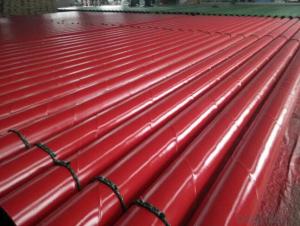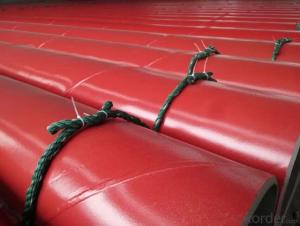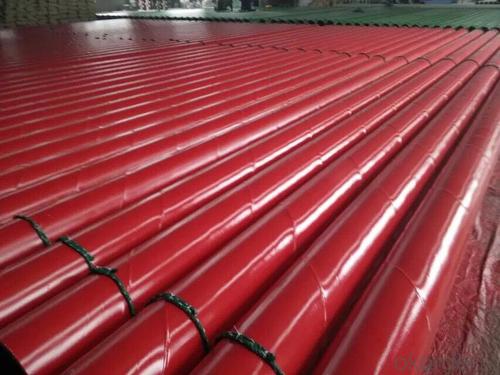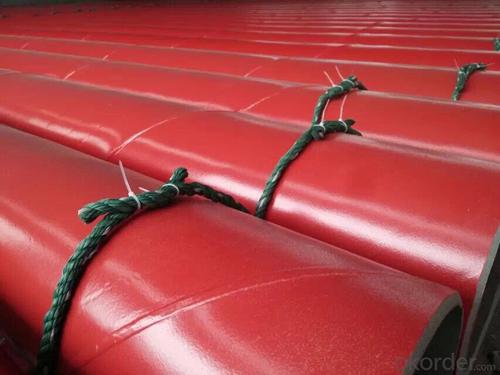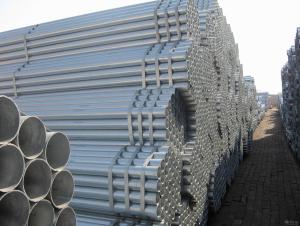welded steel pipe external coating
- Loading Port:
- China Main Port
- Payment Terms:
- TT OR LC
- Min Order Qty:
- -
- Supply Capability:
- -
OKorder Service Pledge
OKorder Financial Service
You Might Also Like
Specifications
water pipeline inner-layer tape
1 Butyl rubber as adhesive
2. SGS test report and DVGW certificate
3. corrosion protection
water pipeline inner-layer tape
State-of-the-Art Pipeline Protection for All Climates & Environments
System description:
WATER PIPELINE Inner -layer tape also be called pipe wrap anti-corrosion tape, polyethylene wrap tape.
water pipeline Inner-layer tapeT100 is engineered to assure a high bond to the primed pipe surface with excellent conformability characteristics, aggressive adhesive for corrosion protection and repair of main line coatings.
Inner-layer tapeT100 series is cold applied tape coating system for corrosion protection of Oil, Gas, Petrochemical, and Waste Waterburied pipeline, pipe can be buried, also can be underground ,overhead ,onshore and offshore .
Structure of water pipeline inner wrap tape
The specification of the tape consists of two layers, adhesive layer and film backing
Adhesive: butyl rubber
Film backing: Special blend of stabilized polyethylene
Features & Benefits
Provides a permanent bond to the primed steel pipes surface and provides protection against chemical electrolytic corrosion for underground pipelines.
long term corrosion protection
Worldwide reference lists. Established in-ground history
High chemical resistance under service temperature.
Outstanding electric property and permanent adhesion.
Cold applied, No release liner. Makes installation fast and easy.
Complies with EN-DIN 30672 and AWWAC-214 international standards and also ASTM standards.
Be used for water pipeline corrosion protection
System Properties
Type | T138 | T 150 | T165 | T180 | T 250 | T265 | T280 | |
Thickness | 15mil 0.38mm | 20mil 0.508mm | 25mil 0.635mm | 30mil 0.762mm | 20mil 0.508mm | 25mil 0.635mm | 30mil 0.762mm | |
Backing | 9mil 0.229mm | 9mil 0.241mm | 10mil 0.25mm | 10mil 0.25mm | 15mil 0.38mm | 20mil 0.508mm | 25mil 0635mm | |
Adhesive | 6mil 0.152mm | 11mil 0.279mm | 15mil 0.381mm | 20mil 0.508mm | 5mil 0.127mm | 5mil 0.127mm | 5mil 0.127mm | |
When used for ductile iron pipes inner layer 980-20 or 980-25 and outer layer 955-20 or 955-25 are recommended. | ||||||||
Elongation | ³300% | ³400% | ||||||
Tensile Strength | 55 N/cm | 70 N/cm | ||||||
Color | Black | White | ||||||
Peel Adhesion to Primed Pipe | 33 N/cm | |||||||
Dielectric Strength | 30 KV | |||||||
Dielectric Breakdown | 26 KV/mm | |||||||
Cathodic Disbandment | 0.24 in radius 6.4 mm | |||||||
Water Vapor Transmission Rate | < 0.1% | |||||||
Volume Resistivity | 2.5 x 1015 ohm.cm | |||||||
Impact resistance | 5.5Nm | |||||||
Penetration Resistance | <15% | |||||||
Performance | AWWA C-209,ASTM D 1000,EN 12068 | |||||||
Order information
Length | 100ft(30 M),200ft(60 M),400ft(120 M),800ft(240 M) |
Width | 2’’(50mm),4’’(100mm),6’’(150mm),17’(450mm),32’’(800mm) |
- Q: What is the maximum diameter of steel pipes?
- The maximum diameter of steel pipes can vary depending on various factors such as manufacturing capabilities, industry standards, and specific project requirements. However, steel pipes can typically range from a few millimeters in diameter for small-scale applications to several meters in diameter for large-scale industrial projects.
- Q: How do you prevent freezing in steel pipes during cold weather?
- One effective way to prevent freezing in steel pipes during cold weather is to insulate the pipes. This can be done by applying foam insulation sleeves or wraps around the pipes. Additionally, ensuring that the pipes are properly sealed and any gaps or cracks are sealed can help prevent cold air from reaching the pipes. It is also important to keep the pipes warm by maintaining a consistent temperature in the surrounding area. This can be achieved by using a space heater or by allowing warm air to circulate around the pipes.
- Q: How are steel pipes used in the construction of telecommunications towers?
- Steel pipes are used in the construction of telecommunications towers as they provide structural support and stability. They are used as the main framework for the tower, forming the vertical columns, horizontal bracing, and diagonal supports. These pipes are capable of withstanding heavy loads, high winds, and other environmental factors, ensuring the tower's durability and longevity. Additionally, steel pipes allow for easy installation and maintenance of antennas, cables, and other telecommunications equipment.
- Q: How does the price of steel pipes vary based on size and grade?
- The price of steel pipes varies based on their size and grade. Generally, larger pipes tend to have higher prices due to the increased amount of materials and manufacturing processes involved. Additionally, the grade of steel used in the pipes also affects the price, with higher-grade steel pipes being more expensive. This is because higher-grade steel offers better strength, durability, and corrosion resistance, making it suitable for specialized applications. Therefore, the price of steel pipes increases as both the size and grade increase.
- Q: What is the difference between hot dip galvanized steel pipe and galvanized steel pipe?
- Galvanized steel pipe is commonly known as "cold plated tube", using electroplating process, only galvanized steel pipe in the outer wall, the wall of the pipe is not galvanizedHot dip galvanized steel pipe adopts hot-dip galvanizing process, and the inner and outer walls of the steel pipe have zinc coating.
- Q: Could you tell me what difference between SC galvanized steel pipe and MT wire pipe?
- SC galvanized steel pipe, its pipe wall thickness, generally 20 steel pipe in 2.2-2.8mm. Also, we often refer to tap water galvanized steel pipe.MT wire pipe, its pipe wall is thin, generally 20 steel pipe in 1.5-2.2mm.
- Q: Can steel pipes be used for underground pressure pipelines?
- Yes, steel pipes can be used for underground pressure pipelines. Steel pipes are known for their strength, durability, and resistance to corrosion, making them suitable for underground applications where pressure is present. Additionally, steel pipes can withstand high temperatures and external forces, making them an ideal choice for underground pressure pipelines.
- Q: What is the hardness of steel pipes?
- The hardness of steel pipes varies depending on the specific grade and manufacturing process used. However, steel pipes are generally known for their high hardness and durability, as they are often designed to withstand heavy loads, abrasive environments, and high-pressure conditions.
- Q: How are steel pipes used in geothermal energy systems?
- Steel pipes are commonly used in geothermal energy systems to facilitate the transport of fluids, such as water or steam, between the geothermal source and the power plant. These pipes are designed to withstand high temperatures and pressures, ensuring the safe and efficient transfer of geothermal fluids. Additionally, steel pipes are used in the construction of geothermal wells, providing structural support and maintaining the integrity of the wellbore.
- Q: Are steel pipes resistant to chemicals and corrosion?
- Generally speaking, steel pipes possess a high resistance to chemicals and corrosion. To further enhance this resistance, protective layers such as zinc or epoxy are often applied to steel pipes. These coatings serve as a barrier, preventing direct contact between chemicals and the steel, thus reducing the risk of corrosion. Moreover, steel itself possesses inherent corrosion-resistant properties, making it a suitable material for applications where exposure to chemicals and corrosive elements is common. However, it is worth noting that the level of resistance may vary depending on the specific type of steel, the chosen coating, and the particular chemicals or corrosive substances involved. Therefore, it is advisable to seek advice from experts and carefully consider the specific requirements of the intended application to ensure the appropriate selection of steel and protective measures, thereby maximizing resistance to chemicals and corrosion.
Send your message to us
welded steel pipe external coating
- Loading Port:
- China Main Port
- Payment Terms:
- TT OR LC
- Min Order Qty:
- -
- Supply Capability:
- -
OKorder Service Pledge
OKorder Financial Service
Similar products
Hot products
Hot Searches
Related keywords
